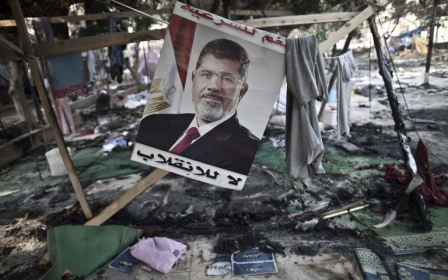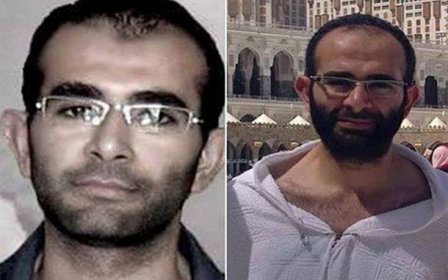Morsi sentenced to death in Egypt

Former Egyptian president Mohamed Morsi was sentenced to death by an Egyptian court on Saturday for his role in a 2011 jailbreak known as the Wadi al-Natroun case. More than 100 others were also sentenced to death in the case.
Sitting in the soundproofed caged dock, Morsi, who was wearing the blue uniform for convicts already sentenced to 20 years in prison, raised his fists in defiance as the judge read out the verdict.
According to AFP, the death penalty for both cases will be confirmed at a later hearing after receiving the approval of the grand mufti, who is the official interpreter of Islamic law. The final decision will be reached on 2 June.
While the mufti’s opinion is not binding to the court, Egyptian law requires judges to seek a religious opinion regarding any death sentence.
The defendants have the right to appeal any final verdict.
Sixteen others were also sentenced to death in a separate espionage case, including Muslim Brotherhood leaders Mohamed al-Baltagy and Khairat al-Shater, in a trial known as the "Hamas Espionage Case". While initial reports indicated that Morsi had also been found guilty of espionage, his case is still ongoing and a verdict is expected at a later date.
International law specialist, Rodney Dixon QC, and legal advisor to President Morsi’s Freedom and Justice Party said: “Everything must be done to overturn this shocking injustice. The military regime must not be allowed to execute the first democratically elected President of Egypt."
"We have already brought the use of mass death penalties in Egypt to the attention of the African Commission of Human and Peoples’ Rights and will now make immediate representations to the United Nations to seek intervention to prevent the death sentence being carried out.”
Emad Shahin, a professor at the American University and Cairo who now teaches in the US, also spoke out against the verdict.
“I repeat my absolute rejection of the charges against me and note that I am hardly the only victim of injustice in this case. Furthermore, I condemn the sham trials engulfing Egypt since July 2013 where wholesale death sentences on flimsy or no evidence have been the mark of the current military regime," he said in a statement.
"In fact, these sentences are yet another manifestation of the deeply troubling way the Egyptian judiciary has been used as a tool to settle political disagreements by the harshest and most repressive means possible. Due process, regard for evidence, and minimum standard of justice have been tossed aside in favour of draconian injustice. Ironically, two defendants sentenced to death today had already been dead and one has been in prison for the past 19 years."
The case has deeply divided Egypt, with people also expressing support for the sentence.
Tarek al-Khouli, a lawyer who is well known for his anti-Muslim Brotherhood views, said that Morsi and his party had “betrayed” Egypt.
"Egypt, which had miraculously survived the evils of those pretend-Islamists before, will prevail in its current battle against them," al-Khouli said in a statement.
Ahead of the verdict, security was tightened around the police academy in eastern Cairo, where the trial took place. There were no reports of protests.
However, several hours after the verdict was handed down, gunmen opened fire at a car carrying judiciary officials and killed the driver, two judges and a prosecutor in the restive Sinai Peninsula, which has seen a rise in militant activity since Morsi was removed from office in 2013.
Another prosecutor was also injured. The judiciary officials had been on their way to a court hearing in al-Arish.
Wadi al-Natroun case
Morsi was found guilty for his role in the Wadi al-Natroun case where hundreds of prisoners escaped on 28 January during the mass jailbreak that happened during the 25 January revolution calling for then president Hosni Mubarak to stand down.
Although Morsi has been accused of plotting the jail break and escaping that night, Morsi told Aljazeera in an audio interview on 28 January that he along with seven other members of the Brotherhood's Guidance Council remained in their cells as unidentified persons helped inmates escape.
Among those who received the death penalty in the same case were five members of Palestinian movement Hamas, although they were not in the prison at the time of the jailbreak and a further defendant, Hassan Salameh, had been serving multiple life sentences in Israeli prison since 1996.
Sami Abu Zuhri, the spokesman for Hamas, denounced the verdict as “deplorable” and stated that “martyrs, prisoners and members of the [Palestinian] resistance” were among the defendants referred to the grand mufti.
“It is a politicised case, and the verdict has tainted the record of the Egyptian judiciary,” Abu Zuhri told the Anadolu Agency.
Egyptian media blames Hamas, an ideological offshoot of Morsi's Muslim Brotherhood, for a series of deadly attacks on security forces carried out since Morsi's overthrow by the army in mid-2013, with some trying to link Hamas to the jailbreak. Hamas has consistently denied the claims.
Muslim Brotherhood channel Mekamleen broadcast a leaked audio last night allegedly belonging to Lieutenant General Sami Anan, the former chief of staff of the Egyptian Armed Forces, who was questioned by a judge in court on whether Hamas and Lebanon's Hezbollah crossed over the Egyptian border in January 2011 to help release the prisoners.
Anan replied "that did not happen" and neither he, nor the Egyptian armed forces, received any information that such a border crossing took place, thus pointing out that Hamas and Hezbollah did not play a role in the Natrun jailbreak.
Human rights groups have previously slammed Egypt’s judiciary process for being “one-sided” and a mockery of justice and Morsi and his co-defendants insist the charges against them are politically motivated.
Turkish President Recep Tayyip Erdogan has also accused Egypt of backwardness and spoke out against Morsi's sentencing.
"The popularly-elected president of Egypt has unfortunately been sentenced to death," Erdogan said at a rally in Istanbul. "Egypt is turning back into ancient Egypt."
In a statement released on Saturday, Amnesty International described the country’s justice system as “deplorable.”
“An Egyptian court’s recommendation today to sentence ousted president Mohamed Morsi and more than 100 other defendants to death after grossly unfair trials shows the deplorable state of the country’s criminal justice system,” the statement read.
Said Boumedouha, Amnesty’s deputy director of Middle East and North Africa program, called the trials a “charade.”
“[Morsi’s] trials were undermined even before he set foot in the courtroom,” Boumedouha said. “The fact that he was held for months incommunicado without judicial oversight and that he didn’t have a lawyer to represent him during the investigations makes these trials nothing but a charade based on null and void procedures.”
Saturday's ruling is the second to be issued against Morsi who was sentenced to 20 years in prison on 21 April, along with 12 other co-defendants, after they were convicted of kidnapping and torturing protesters during clashes between Muslim Brotherhood supporters and opponents outside the Ittihadiya presidential palace in December 2012. Morsi was acquitted on murder charges for that particular case, where 11 people were killed, mostly supporters from the Muslim Brotherhood.
He is still on trial in two separate espionage cases. One alleges that Morsi and 35 other co-defendants conspired to commit terrorist attacks in Egypt with foreign groups such as Hamas, Lebanon’s Hezbollah and Iran’s Revolutionary Guards. The other that he passed state secrets to Qatar.
Since Morsi’s overthrow, Egyptian authorities have launched a relentless crackdown on dissent that has largely targeted Morsi's supporters. According to Human Rights Watch, more than a thousand people have been killed and tens of thousands imprisoned.
Hundreds of largely Muslim Brotherhood supporters have also been sentenced to death in mass trials that have been widely condemned by the international community. Only one person, however, has been executed so far.
New MEE newsletter: Jerusalem Dispatch
Sign up to get the latest insights and analysis on Israel-Palestine, alongside Turkey Unpacked and other MEE newsletters
Middle East Eye delivers independent and unrivalled coverage and analysis of the Middle East, North Africa and beyond. To learn more about republishing this content and the associated fees, please fill out this form. More about MEE can be found here.




